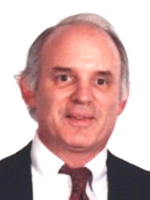- News
- Miscellaneous
- 2021
- March
- March 8, 2021
March 8, 2021
In Memoriam: Dr. Thomas G. Coleman

The Medical Center extends its sympathy to the family of a former faculty member in appreciation for the loved one’s contributions to the academic health sciences center.
Dr. Thomas G. Coleman

Dr. Thomas G. Coleman, UMMC professor emeritus of physiology and biophysics who Dr. Richard L. Summers, UMMC associate vice chancellor for research, described as a “revolutionary thinker” in biomedical research, died Feb. 27. He was 80.
Summers said Coleman, who spent his entire career working and teaching at UMMC, was one of the first in the world to use computer models and simulations to perform physiologic systems analyses.
“His work greatly facilitated the ideas of Dr. Arthur C. Guyton, and their partnership resulted in worldwide acclaim for the University of Mississippi Medical Center,” Summers said. “Later in his career, he and I worked together to provide a foundation for the NASA Digital Astronaut and were able to provide important insights into many perplexing problems associated with astronauts’ physiologic adaptations to the spaceflight environment.
“He was a true mentor and great friend to me and had a huge impact on my career and development as a scientist.”
Dr. John E. Hall, Arthur C. Guyton Professor and Chair of Physiology and Biophysics at UMMC, said everyone in the department is indebted to Coleman for his many contributions to science and medicine.
“Tom was at the center of the fundamental cardiovascular research and mathematical modeling that brought world acclaim to the department and to UMMC,” Hall said. “Tom was a brilliant scientist. Many people do not realize that the famous ‘Guyton’ mathematical model of the cardiovascular system was really the ‘Guyton-Coleman’ model, resulting from the synergistic work of Arthur Guyton and Tom Coleman. Without the work of Tom, the model would never have been developed to become the world’s largest and most important mathematical model of the cardiovascular system, consisting of about 400 variables when it was published in 1972.
“Tom tested the model with rigorous experimental studies and always viewed the model as an ever-evolving ‘theory’ that required continuous updating and validation. He continued to develop the model throughout his life, adapting it to run on personal computers in different computer languages and expanding it to incorporate many other physiological systems. Today, Tom’s mathematical model of human physiology includes over 10,000 variables and is used throughout the world by educators and scientists.”
A native of Rochester, New York, Coleman earned his electrical engineering degree at the University of Rochester in 1962 and his M.S. in electrical engineering at Mississippi State University in 1964. The Ph.D. in biomedical engineering he achieved in 1967 was the first joint degree awarded by the engineering school at MSU and the graduate school at UMMC. He had postdoctoral training at the London Hospital Medical College in London, England.
Coleman authored more than 150 articles in books, periodicals and medical journals during his long, distinguished tenure, and his research has been referenced thousands of times by other scientists. A pioneer in computer-based simulation, he had a longstanding interest in mathematical models of complex biomedical systems with an emphasis on human physiology.
Coleman retired from UMMC in 2013 but continued his contributions to the Medical Center as professor emeritus of physiology and biophysics until shortly before his death. His human physiology models live on in educational and commercial applications.
“Tom leaves a legacy that laid the foundation for a large body of research on cardiovascular and renal physiology, hypertension, heart failure and other disorders,” Hall said. “He was a soft spoken and kind person who was extremely supportive, professionally and personally, to all of us who worked with him.
“Tom never sought recognition for his many accomplishments, but those of us who had the privilege of knowing him certainly recognize his greatness as a person and as a scientist.”
Donations in Coleman’s memory may be made to the School of Graduate Studies in the Health Sciences at UMMC. A celebration of life in his memory will take place at a later date.


